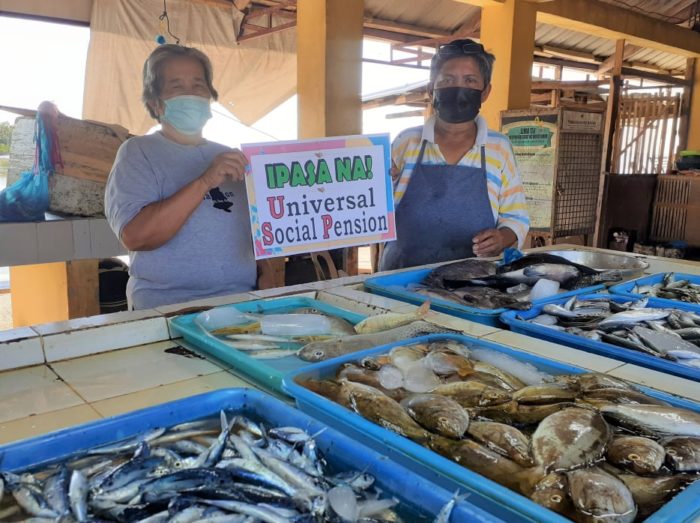Position paper on Universal-Social-Pension_AkaP-Coalition
Position Paper addressed to the Senate Committee on Social Justice, Welfare and Rural Development and authors of Universal Social Pension bills

Aksyon sa Pensyon (AkaP) Coalition and various organizations in the Philippines call for a Universal Social Pension of one thousand pesos for all senior citizens
On February 15, 2010, President Gloria Macapagal Arroyo signed the Republic Act 9994 or Expanded Senior Citizens Act of 2010 which includes a provision of social pension for indigent senior citizens. 1
For the last ten (10) years of implementation, the social pension fund for indigent senior citizens has gradually been increased and in some way provided relief to 3.7 million indigent senior citizens. Based on studies and reports, however, three main issues limit the socio-economic impact of the Government’s current social pension program.
First, the means-tested nature of the scheme excludes–by design–a large proportion of vulnerable older people whose incomes were too meagre to contribute to social security pensions earlier in their lives, and now fail to meet the strict eligibility criteria for the current social pension. Targeting errors also mean many of the older people in extreme poverty are wrongly left out.
Second, the benefit level of PhP 500 per month has become too low considering the inflation rate for the past 10 years since the start of social pension implementation in 2011. The purchasing power of the existing level of benefit has depreciated greatly.
Third, the COVID-19 pandemic has impacted the most senior citizens because of their health and socio-economic vulnerabilities. While we acknowledge the efforts of the government in prioritizing senior citizens in the ongoing vaccination program, many older persons are struggling to make their ends meet because of loss of income or loss of support from children whose livelihoods are also affected by the pandemic.
Meanwhile, for many of those receiving a contributory pension, benefits are also low. In 2015, a third of Social Security System (SSS) retirees (34 per cent) receive less than PhP 2,000 per month, and a half (52 per cent) receive less than PhP 3,000. To address this, a PhP2000 across-the-board pension hike was approved in January 2017, however, SSS pensioners only received half, while the second tranche of the ₱2,000 increase has not been implemented.
The AkaP Coalition and various organizations appreciate the approval of House Bill 9459 in the House of Representatives which increased the level of benefit of social pension for indigent senior citizens from P500 to P1,000 monthly. However, we believe the program should be expanded in its coverage to include all senior citizens.
Therefore, the AkaP Coalition, joined by various organizations, is calling for the passage of a universal social pension for all senior citizens with a benefit level of PhP1,000.
Universal social pension is an affordable investment for the Philippines and should be recognized as a priority policy within the country’s socio-economic agenda. It could provide a strong foundation for the development of the pension system of the country, a stepping stone to building a comprehensive social protection floor, and spur economic growth in the most depressed areas of the Philippines.
Finally, a universal social pension would recognize the contributions to nation-building made by senior citizens throughout their lives, financial or otherwise, as well as empower them to further contribute to the nation’s economic development.
For a life of dignity for all older persons and generations to come, the AkaP Coalition and various organizations, earnestly seek the immediate approval of the universal social pension bill.
____________________________
Aksyon sa Pensyon (AkaP) Coalition
AkaP Coalition is a broad multi-sectoral and intergenerational legislative advocacy network composed of national and grassroots organizations of older persons, youth, women, and informal sector and other sectoral coalitions, movement-based party-list, and human rights groups that focuses on the enactment of the universal social pension law in the Philippines.
Among its members are:
Akbayan Youth
Akbayan Party List
Alliance of Valenzuela City Senior Citizen Associations
Coalition of Services of the Elderly (COSE)
Center for Empowerment and Development of the Elderly and Seniors (CEDES)
Confederation of Older Persons Association of the Philippines (COPAP)
National Federation of Senior Citizens Associations of the Philippines (NFSCAP)
Senior Citizen Sector-National Anti-Poverty Commission (NAPC)
National Senior Citizens Association (NSCA)
Solidarity of Oppressed Filipino People (SOFP/DAMPA)
Safe City Youth Theater Advocacy Group (SCYTAG)
Tanghalang Balangay Community Theater, Inc.
Joining the AkaP Coalition in supporting this position paper are:
Alliance on Gender and Aging in the Philippines (AGAP)
Seniors sa Panahon ng COVID (SPC)
Federation of Senior Citizens Associations of Calapan City (Oriental Mindoro)
Federation of Senior Citizens Associations of Region IV-B
Federation of Senior Citizens Associations of Sagay City (Negros Occidental)
Federation of Senior Citizens Associations of Laurel, Batangas
Federation of Senior Citizens Associations of La Paz, Agusan del Sur
Federation of Senior Citizens Associations of San Luis, Agusan del Sur
Federation of Senior Citizens Associations of Loreto, Agusan del Sur
Federation of Senior Citizens Associations of Esperanza, Agusan del Sur
Federation of Senior Citizens Associations of Bunawan, Agusan del Sur
Arayat Senior Citizens Association, Inc., Arayat, Pampanga
Federation of Loreto Women’s Association, Loreto, Agusan del Sur
Kapatiran ng may Kapansanan sa Loreto, Loreto, Agusan del Sur
1An indigent senior citizen is any citizen aged 60 and over who is “frail, sickly or with disability, and without pension or permanent source of income, compensation or financial assistance from his/her relatives to support his/her basic
needs”